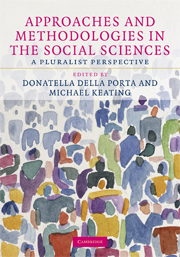Book contents
- Frontmatter
- Contents
- List of figures
- List of tables
- Contributors
- Preface
- 1 Introduction
- Part I Epistemology and philosophy of the social sciences
- 2 How many approaches in the social sciences? An epistemological introduction
- 3 Normative political theory and empirical research
- 4 Causal explanation
- 5 Constructivism: what it is (not) and how it matters
- 6 Culture and social science
- 7 Historical institutionalism
- 8 Game theory
- 9 Rationality and recognition
- Part II Research design
- References
- Glossary
- Index
4 - Causal explanation
Published online by Cambridge University Press: 05 June 2012
- Frontmatter
- Contents
- List of figures
- List of tables
- Contributors
- Preface
- 1 Introduction
- Part I Epistemology and philosophy of the social sciences
- 2 How many approaches in the social sciences? An epistemological introduction
- 3 Normative political theory and empirical research
- 4 Causal explanation
- 5 Constructivism: what it is (not) and how it matters
- 6 Culture and social science
- 7 Historical institutionalism
- 8 Game theory
- 9 Rationality and recognition
- Part II Research design
- References
- Glossary
- Index
Summary
Introduction
This chapter presents a set of approaches to systematic explanation of specific empirical political and social phenomena. These approaches strive to create theoretical, generalizable knowledge with respect to the phenomena in question. In the search for terms of generalization, they differ from research that seeks an in-depth understanding and an ideographic description of the unique and singular aspects of a given empirical political or social phenomenon (see Bray, ch. 15). Rather, they concentrate on theory development and the use of empirical cases or observations as illustrations or as a way of testing hypotheses and theories (Von Wright 1971: 19). This type of social science strives to provide answers to ‘why’ questions by seeking to identify one or several antecedent factors (explanans) that are responsible for the occurrence of the event or behaviour in question (explanandum) (Nachmias and Frankfort-Nachmias 1976). As Gerring (2005: 170) puts it: ‘to be causal, the cause in question must generate, create, or produce the supposed effect’.
The procedures of explanation discussed here are all based on the ontological (unproven) assumptions that there are recognizable regularities and a recognizable order in the world ‘out there’. No causal argument can be made without making a number of assumptions about how the world works – ‘that there is a degree of order and structure and that change itself is patterned and can be understood’ (Nachmias and Frankfort-Nachmias 1976: 6–7).
Information
- Type
- Chapter
- Information
- Approaches and Methodologies in the Social SciencesA Pluralist Perspective, pp. 61 - 79Publisher: Cambridge University PressPrint publication year: 2008
Accessibility standard: Unknown
Why this information is here
This section outlines the accessibility features of this content - including support for screen readers, full keyboard navigation and high-contrast display options. This may not be relevant for you.Accessibility Information
- 16
- Cited by
